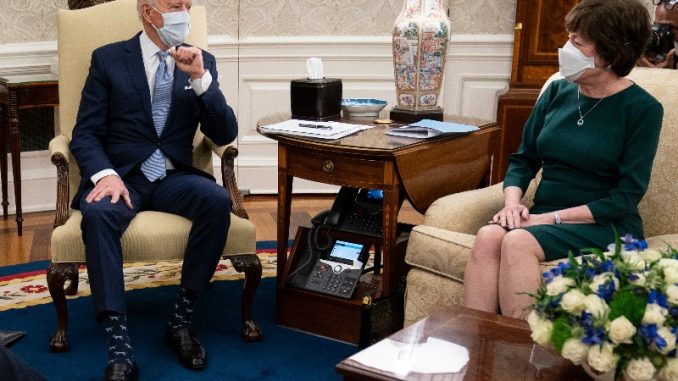
After meeting with Republican senators at the White House on Monday, President Joe Biden appeared poised to push forward with his $1.9 trillion COVID-19 relief plan even if it fails to draw Republican support.
While the White House termed Biden’s discussion with 10 Republicans who pitched a downsized relief effort as “productive,” the Democratic president told the senators their plan did not go far enough.
Biden told the group “that he will not slow down work on this urgent crisis response, and will not settle for a package that fails to meet the moment,” White House spokeswoman Jen Psaki said.
The Republicans who attended the meeting are pushing a COVID-19 relief proposal about one third the size of Biden’s.
Earlier on Monday, top Democrats in the U.S. Senate and House of Representatives filed a joint $1.9 trillion budget measure, a step toward bypassing Republicans altogether on a new virus relief bill.
Senate Majority Leader Chuck Schumer announced the plan for the fiscal-year 2021 budget measure in the Senate and House, saying it would allow Congress to fast-track a coronavirus package for passage by both chambers.
The measure would allow Democrats to bypass a 60-vote threshold in the closely divided Senate and enact coronavirus legislation with a simple majority through a procedure called reconciliation.
It would mark the first time congressional Democrats used the maneuver to flex their legislative muscle since winning razor-thin control of the Senate in two runoff elections last month in Georgia.
The 100-seat Senate is divided 50-50, with Vice President Kamala Harris holding the tie-breaking vote to give Democrats the majority.
Treasury Secretary Janet Yellen is expected to meet with Senate Democrats on the relief measure on Tuesday, the department said.
Schumer spoke ahead of the Oval Office meeting on Monday evening among Biden, Harris and the 10 Republican senators, who have proposed a $618 billion relief package.
Susan Collins, one of the Republicans attending, said the discussion was “frank and useful” but yielded no breakthroughs. She said the sides would keep talking.
What “we did agree to do was to follow up and talk further at the staff level and amongst ourselves and with the president and vice president on how we can continue to work together on this very important issue,” Collins said.
Biden affirmed to the group, however, that he was prepared to push through a comprehensive bill with a party-line vote, Psaki said.
The president “reiterated that while he is hopeful that the Rescue Plan can pass with bipartisan support, a reconciliation package is a path to achieve that end,” Psaki said.
COVID-19 has claimed more than 440,000 lives in the United States, the most of any country, and cost millions of Americans their jobs.
‘MUST-HAVES’
The Republican plan offers no assistance to state and local governments, one of the items that a Biden adviser described as “must-haves” for Democrats in Congress.
According to details released by the lawmakers, the Republican proposal also falls short on another must-have by offering only $1,000 in direct payments to Americans, compared with the $1,400 sought by Biden.
“We have not seen many red lines drawn publicly by Democrats in Congress. I think we will see those red lines if the White House considers taking some things out or delaying some items,” the adviser said, speaking on condition of anonymity.
Passage of new relief legislation would not only affect Americans and businesses but offer an early test of Biden’s promise to work to bridge the partisan divide in Washington.
Ten Republican votes, combined with the backing of 50 Democrats and independents, would be enough to move bipartisan legislation quickly through the Senate. There was little cooperation between the two parties on major legislation in Congress under Republican former President Donald Trump.
Senator Pat Toomey, who does not back the compromise proposal offered by fellow Republicans, said in a statement that the government needed to focus on vaccine distribution at this juncture of the pandemic rather than economic stimulus.
“Once we’ve made significant progress on this goal, then Congress can revisit what pockets of the economy still require assistance,” Toomey said.
Via Newsmax
